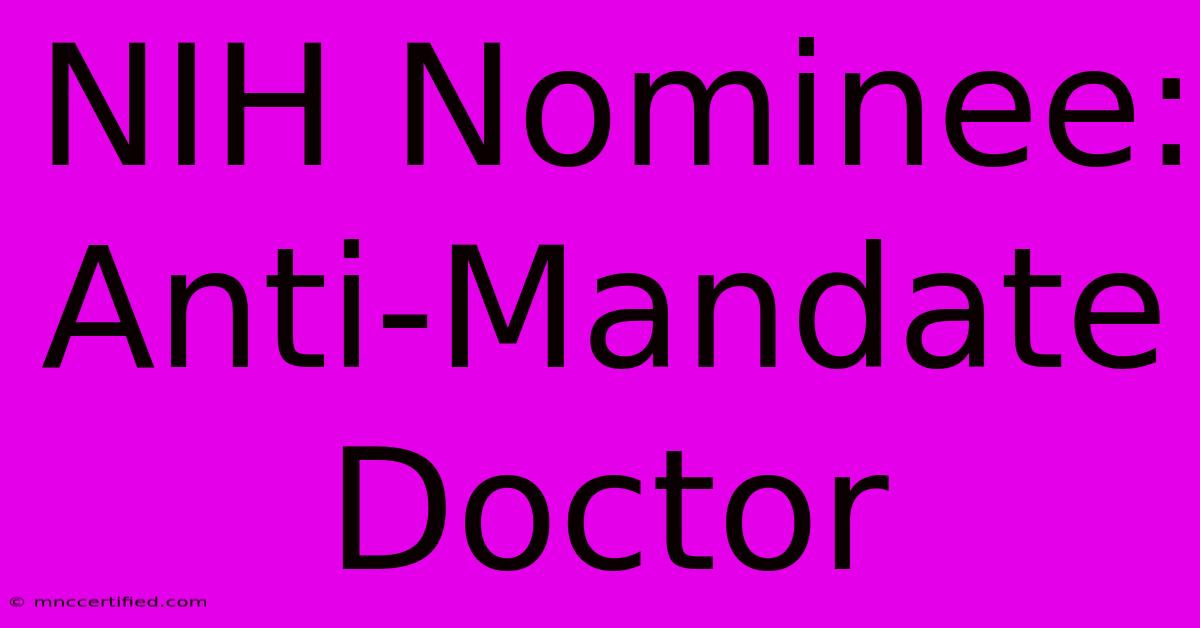NIH Nominee: Anti-Mandate Doctor

Table of Contents
NIH Nominee Faces Scrutiny: Anti-Mandate Doctor Sparks Debate
The nomination of Dr. [Nominee's Name] to the National Institutes of Health (NIH) has ignited a fierce debate, centering on the nominee's outspoken opposition to COVID-19 vaccine mandates. This article delves into the controversy, examining Dr. [Nominee's Name]'s public statements, the arguments for and against the nomination, and the broader implications for public health policy.
Dr. [Nominee's Name]'s Stance on Vaccine Mandates
Dr. [Nominee's Name]'s public profile reveals a consistent and vocal opposition to mandatory COVID-19 vaccination. This stance is based on [Clearly state the reasons cited by the doctor, e.g., concerns about individual liberties, questioning vaccine efficacy/safety, etc.]. Specific examples of their statements include [Provide specific quotes or links to verifiable sources, e.g., tweets, interviews, published articles]. It's crucial to note that these statements have been interpreted differently by various groups, leading to the current polarization.
Analyzing the Arguments Against Mandatory Vaccination
Dr. [Nominee's Name]'s arguments against mandates often center on [Summarize the core arguments, e.g., bodily autonomy, informed consent, potential adverse effects]. Supporters of the nominee emphasize the importance of [Highlight the values and principles underlying the opposition, e.g., individual freedom of choice, the right to question authority]. They argue that a nuanced discussion about vaccine safety and efficacy is necessary, and that mandates stifle open dialogue and critical thinking.
Counterarguments and Public Health Concerns
Conversely, opponents of the nomination raise concerns about the potential impact on public health. They argue that vaccine mandates are crucial for [Explain the rationale for mandates from a public health perspective, e.g., herd immunity, protecting vulnerable populations]. The potential consequences of reduced vaccination rates, such as increased transmission and the emergence of new variants, are highlighted as significant risks. Furthermore, critics point to the nominee's potential influence on NIH research priorities and funding decisions.
Impact on NIH Research and Funding
Dr. [Nominee's Name]'s appointment could significantly impact the direction of NIH research, particularly in areas related to infectious diseases and vaccine development. Concerns exist that their views might influence funding decisions, potentially diverting resources away from vaccine research or promoting research that supports their position. This potential shift in research priorities could have far-reaching consequences for the nation's preparedness for future pandemics.
The Broader Implications for Scientific Discourse
This nomination highlights a deeper issue: the tension between individual liberties and public health imperatives. The debate surrounding Dr. [Nominee's Name]'s nomination underscores the need for open, evidence-based discussions about vaccine safety, efficacy, and the role of mandates in protecting public health. It forces a crucial examination of how scientific consensus is formed and communicated, particularly in times of crisis.
Moving Forward: A Call for Transparency and Open Dialogue
The confirmation process for Dr. [Nominee's Name] should prioritize transparency and engage in a thorough vetting of the nominee's qualifications and potential influence on the NIH's mission. Open and respectful dialogue that acknowledges diverse perspectives is essential to navigating this complex issue. Moving forward, ensuring that public health decisions are grounded in robust scientific evidence, while simultaneously respecting individual rights, remains a critical challenge.
Keywords: NIH, Nominee, Anti-Mandate, Vaccine, COVID-19, Public Health, [Nominee's Name], Mandates, Controversy, Debate, Scientific Discourse, Research Funding, Individual Liberties
Note: Remember to replace the bracketed information with accurate details about the specific nominee and situation. Thoroughly research and cite your sources to ensure accuracy and credibility. This detailed outline provides a strong framework for an SEO-optimized blog post. Remember to use internal and external links appropriately to improve search engine rankings and user experience.

Thank you for visiting our website wich cover about NIH Nominee: Anti-Mandate Doctor. We hope the information provided has been useful to you. Feel free to contact us if you have any questions or need further assistance. See you next time and dont miss to bookmark.
Featured Posts
-
Dementia Battle Wendy Williams Status
Nov 27, 2024
-
Incognito Freeman Seen In Los Angeles
Nov 27, 2024
-
Moore And Associates Insurance
Nov 27, 2024
-
Morrisons Shortages Three Aisles Empty
Nov 27, 2024
-
Village Auto Insurance Company
Nov 27, 2024